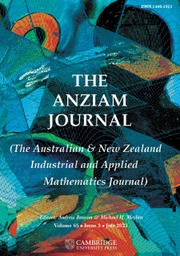Article contents
PRICING PERPETUAL TIMER OPTION UNDER THE STOCHASTIC VOLATILITY MODEL OF HULL–WHITE
Published online by Cambridge University Press: 16 May 2017
Abstract
The valuation of perpetual timer options under the Hull–White stochastic volatility model is discussed here. By exploring the connection between the Hull–White model and the Bessel process and using time-change techniques, the triple joint distribution for the instantaneous volatility, the cumulative reciprocal volatility and the cumulative realized variance is obtained. An explicit analytical solution for the price of perpetual timer call options is derived as a Black–Scholes–Merton-type formula.
- Type
- Research Article
- Information
- Copyright
- © 2017 Australian Mathematical Society
References
- 1
- Cited by


